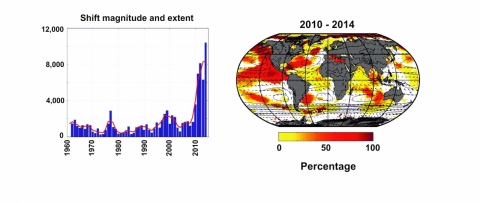
Prediction of unprecedented biological shifts in the global ocean. Beaugrand, G., Conversi, A., Atkinson, A., Cloern, J., Chiba, S., Fonda-Umani, S., Kirby, R.R., Green, C.H., Goberville, E., Otto, S.A., Reid, P.C., Stemmann, L., Edwards, M. (2019). Nature Climate Change. DOI : 10.1038/s41558-019-0420-1
Impermanence is an ecological principle but there are times when changes occur nonlinearly as abrupt community shifts (ACSs) that transform the ecosystem state and the goods and services it provides. Here, we present a model based on niche theory to explain and predict ACSs at the global scale. We test our model using 14 multi-decadal time series of marine metazoans from zooplankton to fish, spanning all latitudes and the shelf to the open ocean. Predicted and observed fluctuations correspond, with both identifying ACSs at the end of the 1980s and 1990s. We show that these ACSs coincide with changes in climate that alter local thermal regimes, which in turn interact with the thermal niche of species to trigger long-term and sometimes abrupt shifts at the community level. A large-scale ACS is predicted after 2014—unprecedented in magnitude and extent—coinciding with a strong El Niño event and major shifts in Northern Hemisphere climate. Our results underline the sensitivity of the Arctic Ocean, where unprecedented melting may reorganize biological communities, and suggest an increase in the size and consequences of ACS events in a warming world.
BOREA contact: Eric Goberville, eric.goberville@upmc.fr
Press release CNRS, February 25, 2019
